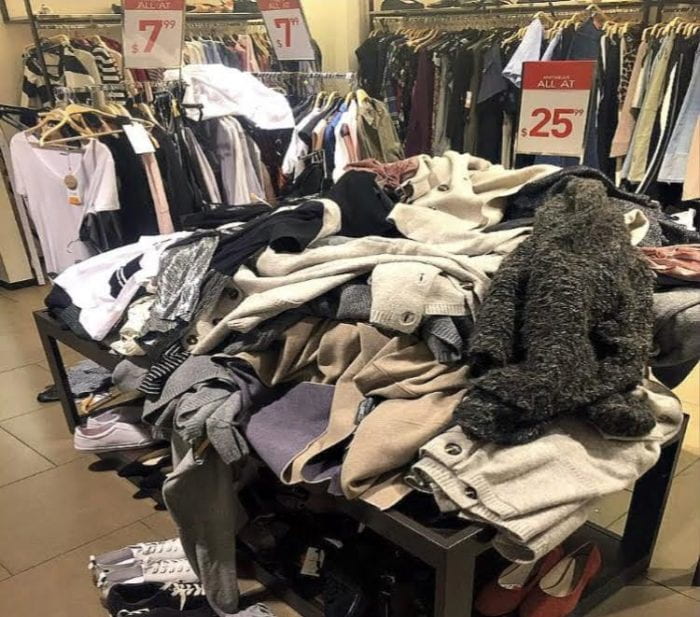Привет, et salut tout le monde!
My name’s Alice and I’m a French and Russian major in the class of 2021. I’m an international student at Amherst, and I come from the lovely North-East of England where you can always find a welcome lot warmer than our very changeable weather! In fact, as the stereotype goes, we hardy northerners love to dress up, and are so dedicated to our snappy looks that we’re rarely, if ever, caught wearing a jacket, even on the chilliest of Newcastle nights out.
Even if, like many of us, you don’t always have a lot of cash to spend, high street fashion chains have your back, providing plenty of options to buy brand new outfits without breaking the bank.
However, our appetite for trendy clothes at ever-lower prices is wreaking havoc on the health of our planet. In the UK, we buy more clothes every year than any other country in Europe. And we’re not treating them with care – the clothes sent to UK landfill every year weigh as much as the Empire State Building! The global fashion industry has a bigger carbon footprint than all global shipping and aviation combined, so if we’re going to tackle the ongoing Climate Crisis, we need to fundamentally change our relationship with the clothes we wear.
I’m very lucky to be studying in Paris, which has pledged to become the Sustainable Fashion Capital of the world by 2024, when France will host the Olympic Games. It’s an exciting time to be in the French capital, as the ‘Paris Good Fashion’ initiative is aiming to improve sourcing and traceability of garment production, to make the processes involved in fashion retail sustainable, and to move towards a circular economy within the fashion industry – moreover, to have all of these aims written into law.
I’m so excited by the ‘Paris Good Fashion’ initiative because of its dual focus on ensuring that the fashion industry is both sustainable with regards to the climate emergency, and ethical throughout its supply chains. It’s clear that if fashion isn’t ethical, it can’t be sustainable (Fashion Revolution) and the issues of sustainability and ethics in the fashion industry go hand in hand. First and foremost, we need to honour the work of the world’s 60 million garment workers, be mindful of the injustices they face under our current system and work urgently to protect the planet we share. It’s worth noting that while the clothes we’re wearing produce 20% of global wastewater and 10% of global carbon emissions, they’re often produced in countries who depend on the fashion industry for their GDP and are particularly vulnerable to the effects of rising global temperatures – ordinary garment workers will be hit first and worst by the effects of our failure to control the environmental destruction caused by the fashion industry.
Over the course of the semester, I hope to explore the worst excesses of the fashion industry as seen in Paris, and the efforts of those who are changing the face of the fashion industry. Both luxury, and fast fashion, have faced outcry in France after the discovery of high end fashion brands burning or ruining unsold stock so that it would not be donated or sold at more affordable prices. Blogger Nathalie Beauval sparked outrage in France after she posted a photo of high-street clothing chain Celio destroying unsold clothes – she suggested on Facebook that they should be donated, and not destroyed. French activists for Greenpeace and Extinction Rebellion, among others, have expressed their outrage at the inherently wasteful nature of the fast fashion brands operating in France through sustained campaigns and public protest.
I plan to interview those working in sustainable fashion business which aim to persuade the consumer away from mainstream commercial fashion towards more compassionate ways of dressing ourselves, and learn about the triumphs and drawbacks of their alternative business models. You can expect a blog post taking a closer look at ‘La Boutique Sans Argent’ (The Store Without Money), a Paris project which has established an entirely donation-based fashion shop, where all the items are free for ‘customers’ to take. By removing the element of money, the founders aim to change our relationship with the garments we acquire and wear.
I also seek to learn from those involved with changing the laws which govern the French fashion industry. Perhaps the most important change to the French legislature is the ambitious proposition that every unsold, unworn garment be donated for recycling or ideally, re-use. I hope to source an interview with Brune Poirson, Secretary of State to the French Minister for the Ecological and Solidary Transition, who was instrumental in proposing the measure, and investigating the motivations for, and difficulties facing, the bill’s future in the French law.
Overall, I hope to use this project as an opportunity to radically transform the way I think about the origin of clothes, and the act of dressing, and center people and the planet in envisioning a sustainable future for fashion, from the city which shapes the way we dress around the world. I’ll be sharing what I’ve learned throughout the journey and hopefully providing insights into how we can help change the fashion industry, from the clothes in our own wardrobes, to the laws which govern how they get there, in a way that’s accessible, affordable and practical. You can expect more regular updates on all things sustainable fashion over at https://sustainablefashionalice.wordpress.com/, but until next time – thank you so much for sticking it out to the final paragraph, dear reader, and starting this journey with me!

A pile of clothes on sale at a European mall
In solidarity,
Alice